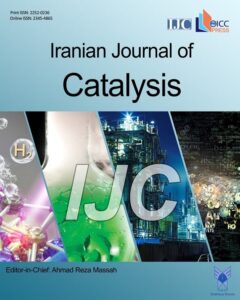Operating condition effect on achieving higher propene yield in propane oxidative dehydrogenation process
Authors
Abstract
Supported vanadia catalyst was successfully synthesized using wet impregnation of gamma-Alumina to study Propane Oxidative Dehydrogenation (POD). The prepared catalysts were characterized with XRD, BET, and TPR tests. In a broad temperature range (340 to 630°C), effects of vanadia loading (2.7, 5.4, and 9 wt%) and propane to oxygen ratio (3/1 to 1/3) were investigated on propane conversion as well as propene yield at atmospheric pressure. Results indicate that by increasing the vanadia content the activity of catalyst increases while selectivity to propene decreases monotonically. As the temperature increases from 340°C to 630°C, yield to propene shows ascending behavior in case of all catalyst samples. Yield to propene shows a climax with changing propane to oxygen ratio from 3/1 to 1/3. The yield increases with increase in oxygen partial pressure of feed until equimolar ratio of propane and oxygen, then it declines with further increase of oxygen partial pressure. Higher propene yields were observed at higher temperatures and equimolar feed ratio of propane and oxygen (C3/O2=1/1). A maximum propene yield of 17% was experienced on catalyst with 2.7 wt% vanadia at temperatures at 550°C.


